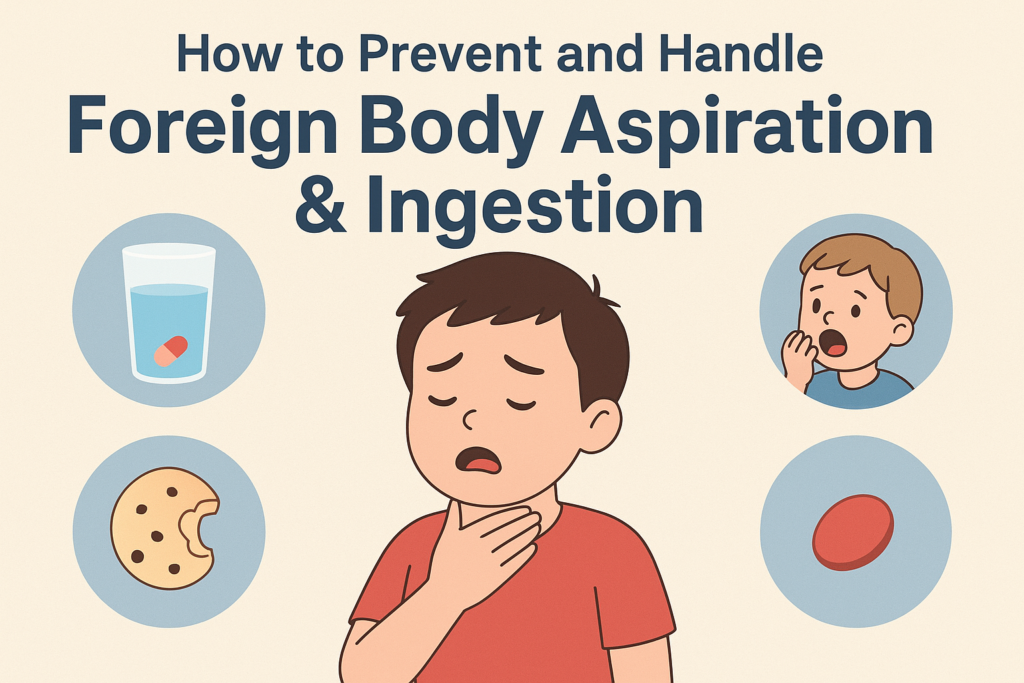Children are naturally curious. They love to explore the world with their hands—and often, their mouths. While this is a normal part of development, it also puts them at risk of foreign body aspiration (when something goes into the airway) or ingestion (when something gets swallowed). Both situations can be frightening for parents and dangerous for children if not handled quickly.
At CLIO Mother & Child Institute, we frequently see worried parents rushing in because their child has swallowed a coin, button, bead, or even choked on food. The good news is that most cases can be prevented, and when they do happen, knowing what to do makes all the difference.
Common Objects Children Inhale or Swallow
- Small toys and parts – building blocks, beads, marbles, buttons.
- Coins and batteries – especially button batteries, which can be very harmful.
- Food items – peanuts, popcorn, grapes, hard candy.
- Household items – safety pins, screws, pen caps.
Warning Signs to Watch For
Sometimes it’s obvious when a child has swallowed or aspirated something, but other times the signs can be subtle. Look out for:
- Sudden coughing, gagging, or choking while eating or playing.
- Difficulty breathing, noisy breathing, or wheezing.
- Drooling, difficulty swallowing, or refusal to eat.
- Vomiting or chest discomfort.
- If swallowed, symptoms may include stomach pain, nausea, or blood in vomit/stool.
If you notice any of these, especially breathing difficulty, seek medical help immediately.
How Parents Can Prevent It
Prevention is always better than emergency treatment. A few simple precautions can go a long way:
- Child-proof your home. Keep tiny items out of reach, such as buttons, pins, coins, and batteries.
- Age-appropriate toys. Toys with tiny, removable parts should not be given to children younger than three.
- Safe eating habits. Cut food like grapes and sausages into small pieces. Avoid giving peanuts, popcorn, or hard candy to toddlers.
- Supervised play. Always keep an eye on children when they are playing with toys or eating.
Teach older siblings. Make sure they know not to give small objects to younger children.
What To Do If It Happens
Even with precautions, accidents can still occur. Here’s how to respond calmly and correctly:
If your kid is choking, meaning they are unable to cough, talk, or breathe:
- Infants (under 1 year): Place the baby face-down on your forearm, support the head, and give 5 firm back blows between the shoulder blades. If not relieved, turn the baby face up and give 5 chest thrusts (similar to CPR compressions but gentler).
- Children above 1 year: Perform the Heimlich maneuver – stand behind the child, wrap your arms around their waist, make a fist, place it just above the navel, and give quick upward thrusts. Repeat until the object comes out.
If your child swallowed an object but is not choking:
- Do not make them vomit.
- Do not give food or water.
- Take them to the hospital immediately, especially if it’s a coin, sharp object, magnet, or battery. Within hours, button batteries have the potential to cause serious burns.
When to See a Doctor Immediately
- If your child has persistent coughing, wheezing, or breathing difficulty.
- If you suspect they swallowed a battery, magnet, sharp object, or coin.
- If there’s blood in vomit or stool.
- if your youngster has trouble swallowing saliva or meals.
Final Thoughts
Although aspirating or ingesting a foreign body might be frightening, major problems are frequently preventable with awareness and quick action. The key is prevention, quick recognition, and timely medical help.
At CLIO Mother & Child Institute, our pediatric specialists are trained to handle such emergencies with advanced diagnostic tools and safe procedures. If you ever face such a situation, don’t panic—reach out for immediate medical assistance.
Remember: A few preventive steps at home and knowing basic first aid can save your child’s life.


